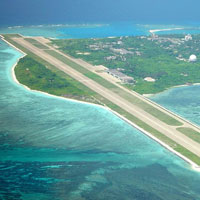Manila seeks more US troops,
joint war drills; China protests
By Alfred Gabot
MANILA/WASHINGTON – Tension has mounted again over the disputed Spratlys groups of islands, reefs and atolls as the Philippines called for expanded US forces expansion in the region and bigger war exercises in the South China Sea and West Philippine Sea.

The Spratlys group are being claimed in whole and in part by six countries led by the Philippines and China. The claims are now heated due to the presence of rich oil deposit in the area and its position as a strategic security and military area.
China said its claims are based on historical rights but Manila insists that the island chain or part of it are within the Philippine territory based on the United Nations convention. The Philippines have protested continued intrusions of China in the disputed islands.
This developed as the US and the Philippines concluded a dialogue in which they agreed to extend more assistance to the Philippines, and more high level meetings are set in Washington prior to the holding of bilateral talks between US President Barack Obama and Philippine President Benigno S. Aquino III at the White House in May or June.
Prior to the dialogue, a group of US senators and US congressmen led by Sen. John McCain held dialogues with President Aquino and other government officials, discussing among others defense and security concerns.
During the dialogue, Philippine defense officials pointed out that its priority is to strengthen maritime defenses, especially near the South China Sea. They indicated a willingness to host U.S. ships and surveillance aircraft.
Other options under consideration are operating Navy ships from the Philippines, deploying troops on a rotational basis and staging more frequent joint exercises,
In recent months, the United States has announced plans to set up a Marine base in northern Australia and station warships in Singapore, moves seen in China as a part of a broader US attempt to encircle it as it grows into a major power in the region.
A missile destroyed attached to the Seventh Fleet strike group, meanwhile, docked in Manila for a port call and recreation for its officers and men led by a Filipino-American commander who graduated from the US Naval Academy.
The call of the Philippines for expanded US presence in the Philippines and the region immediately caught the ire of China which said it was a threat to the security in the Asia-Pacific region.
A China daily newspaper even called for the imposition of sanctions against Manila for its call for more US troops and stronger presence in the region.
To ease the tension, Malacanang officials announced that the country remains committed towards peaceful Asia-Pacific region
The Philippines remains committed in ensuring peace and stability in the Asia-Pacific region in the midst of a stronger military cooperation with the United States, said Deputy
Presiidential Spokesman Abigail Valte.
“From our point of view we continue to be committed to ensuring peace and stability in the region. And again in connection to whatever disputes that we may have our commitment remains firm that we will pursue every diplomatic channel, avenue and recourse that we may be able to solve it peacefully,” Valte said in Malacanang.
Valte made this statement in reaction to a question whether China has something to worry about with regards to the Philippines’s commitment towards peace and stability in the region.
Valte said the Philippines will not compromise the peace in the region even as the country forges bilateral relations with other countries.
On Sunday, China’s state media said the Chinese government should impose “sanctions” against the Philippines after the latter offered to allow more US troops on its soil. The statement came in the midst of growing tensions over the disputed waters in the West Philippine Sea (South China Sea).
Valte reiterated that dispute on the West Philippine Sea is a small facet of the good relationship between China and the Philippines. She said the Philippines has been pursuing several other relationships with China such as tourism and trade which was bolstered by President Aquino’s visit there last year.
The President’s spokesperson also reiterated that the discussion on the expanded presence of the US in the region is something that is still in the early stages of talks.
“Nothing is final yet. We have expressed several initiatives mainly on how to assist us to boost our defense capabilities. Again, as we stated earlier, we really do need to catch up with our neighbors when it comes to our defense capabilities,” she said.
Last year, the Philippines and Vietnam complained on what they said were increasingly aggressive acts by China in the decades-long rift.



 ShareThis
ShareThis